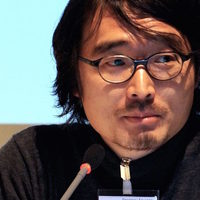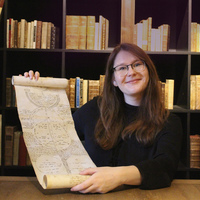
Kyung-Ho Cha
- since 8/2023: research associate in the EU-Horizon-Europe Project CAPONEU ("Cartography of the Political Novel in Europe"), ZfL Berlin Leibniz Centre for Literary and Cultural Research
- 6/2023: 2nd place on the shortlist for the W2 professorship in 'Modern German Literature ' at the University of Paderborn
- 2013–2020, 2021-2023: (Partial) Substitute for the Professorship of Modern German Literature, University of Bayreuth
- 2018–2023: Senior lecturer (without tenure track), University of Bayreuth
- 6/2021: place on the shortlist for the W3 professorship in 'Modern German Literature with a Focus on Cultural and Literary Theory' at the University of Hamburg
- 2020: Habilitation
- 2011, 2012–2018: Junior professor (without tenure track) for literature/media/knowledge in Modern German Literary Studies, University of Bayreuth
- 2008–2011: research associate, DFG project, Institute for German and Dutch Philology/Free University of Berlin
- 2010: PhD in German and General Literary Studies, Technical University of Berlin
- 2004-2007: DFG doctoral researcher at the Research Training Group "Stagings of the Body"/Free University Berlin; associate member of the Research Training Group "Classicism and Romanticism"/Justus Liebig University Giessen
- Studies in Modern German Literature, Medieval Literature, and Philosophy as a fellow of the German Academic Scholarship Foundation (University of Bonn, Oxford University, Columbia University New York)
- seit 8/2023; wissenschaftlicher Mitarbeiter im EU-Horizon-Projekt CAPONEU (»Cartography of the Political Novel in Europe«), ZfL Berlin Leibniz-Zentrum für Literatur- und Kulturforschung
- 6/2023: Listenplatz 2 im Berufungsverfahren für die W2-Professur für „Neuere deutsche Literatur“ an der Universität Paderborn
- 2013–2020, 2021-2023: (Teil-)Vertretung des Lehrstuhls für Neuere deutsche Literaturwissenschaft, Universität Bayreuth
- 2018-2023: Akademischer Oberrat auf Zeit/Universität Bayreuth
- 6/2021: Listenplatz im Berufungsverfahren für die W3-Professur für „Neuere deutsche Literatur dem Schwerpunkt Kultur- und Literaturtheorie“ an der Universität Hamburg
- 2020: Habilitation
- 2011, 2012-2018: Juniorprofessor (ohne tenure track) für Literatur/Medien/Wissen im Fach Neuere deutsche Literaturwissenschaft/Universität Bayreuth
- 2008-2011: wissenschaftlicher Mitarbeiter, DFG-Projekt, Institut für Deutsche und Niederländische Philologie/Freie Universität Berlin
- 2010: Promotion im Fach Deutsche und Allgemeine Literaturwissenschaft, Technische Universität Berlin
- 2004-2007: DFG-Promotionsstipendiat am Graduiertenkolleg »Körper-Inszenierungen«/Freie Universität Berlin; assoziiertes Mitglied des Graduiertenkollegs »Klassizismus und Romantik«/Justus-Liebig-Universität Gießen
- Studium der Neueren deutschen Literatur, Mediävistik und Philosophie als Stipendiat der Studienstiftung des deutschen Volkes (Universität Bonn, Oxford University, Columbia University New York)
Address: Leibniz-Zentrum für Literatur- und Kulturforschung
Pariser Straße 1, 10719 Berlin
- 6/2023: 2nd place on the shortlist for the W2 professorship in 'Modern German Literature ' at the University of Paderborn
- 2013–2020, 2021-2023: (Partial) Substitute for the Professorship of Modern German Literature, University of Bayreuth
- 2018–2023: Senior lecturer (without tenure track), University of Bayreuth
- 6/2021: place on the shortlist for the W3 professorship in 'Modern German Literature with a Focus on Cultural and Literary Theory' at the University of Hamburg
- 2020: Habilitation
- 2011, 2012–2018: Junior professor (without tenure track) for literature/media/knowledge in Modern German Literary Studies, University of Bayreuth
- 2008–2011: research associate, DFG project, Institute for German and Dutch Philology/Free University of Berlin
- 2010: PhD in German and General Literary Studies, Technical University of Berlin
- 2004-2007: DFG doctoral researcher at the Research Training Group "Stagings of the Body"/Free University Berlin; associate member of the Research Training Group "Classicism and Romanticism"/Justus Liebig University Giessen
- Studies in Modern German Literature, Medieval Literature, and Philosophy as a fellow of the German Academic Scholarship Foundation (University of Bonn, Oxford University, Columbia University New York)
- seit 8/2023; wissenschaftlicher Mitarbeiter im EU-Horizon-Projekt CAPONEU (»Cartography of the Political Novel in Europe«), ZfL Berlin Leibniz-Zentrum für Literatur- und Kulturforschung
- 6/2023: Listenplatz 2 im Berufungsverfahren für die W2-Professur für „Neuere deutsche Literatur“ an der Universität Paderborn
- 2013–2020, 2021-2023: (Teil-)Vertretung des Lehrstuhls für Neuere deutsche Literaturwissenschaft, Universität Bayreuth
- 2018-2023: Akademischer Oberrat auf Zeit/Universität Bayreuth
- 6/2021: Listenplatz im Berufungsverfahren für die W3-Professur für „Neuere deutsche Literatur dem Schwerpunkt Kultur- und Literaturtheorie“ an der Universität Hamburg
- 2020: Habilitation
- 2011, 2012-2018: Juniorprofessor (ohne tenure track) für Literatur/Medien/Wissen im Fach Neuere deutsche Literaturwissenschaft/Universität Bayreuth
- 2008-2011: wissenschaftlicher Mitarbeiter, DFG-Projekt, Institut für Deutsche und Niederländische Philologie/Freie Universität Berlin
- 2010: Promotion im Fach Deutsche und Allgemeine Literaturwissenschaft, Technische Universität Berlin
- 2004-2007: DFG-Promotionsstipendiat am Graduiertenkolleg »Körper-Inszenierungen«/Freie Universität Berlin; assoziiertes Mitglied des Graduiertenkollegs »Klassizismus und Romantik«/Justus-Liebig-Universität Gießen
- Studium der Neueren deutschen Literatur, Mediävistik und Philosophie als Stipendiat der Studienstiftung des deutschen Volkes (Universität Bonn, Oxford University, Columbia University New York)
Address: Leibniz-Zentrum für Literatur- und Kulturforschung
Pariser Straße 1, 10719 Berlin
less
Related Authors
Kyra Gerber
University of Amsterdam
Raphael Hoermann
University of Central Lancashire
Christian Neddens
Lutherische Theologische Hochschule Oberursel
Manuel Disegni
Università degli Studi di Torino
InterestsView All (13)






Uploads
Books by Kyung-Ho Cha
Die zentrale These der Untersuchung lautet, dass mit der Figur des guten Staatsbürgers und der guten Staatsbürgerin ein politisches Ethos dargestellt wird, das das Fundament für das Zusammenleben im Staat bilden soll. Die Studie endet in der Mitte des 19. Jahrhunderts, als das politische Tugendideal an Bedeutung verliert und die Vorstellung
vom deutschen Staatsbürger, der durch seine Zugehörigkeit zur Nation definiert wird, an
Popularität gewinnt.
---------------------------------------------------------------------------------------------------------------------------------------------------------------------------------------------
The good citizen is an ancient ideal. The book is dedicated to the transformation of the political ideal of virtue from antiquity to the 19th century. The historical focus is on the decades between 1789 and 1848, which were characterized by political and social tensions that led to a crisis of legitimacy in the relationship between citizens and the state. As a reaction to this crisis, a number of different ideas about the ideal citizen serving the common good emerged. The work focuses on selected texts by Friedrich Schiller, Johann Wolfgang Goethe, Novalis, Heinrich von Kleist, Heinrich Heine, Louise Aston and Georg Büchner, which are analyzed as literary thought experiments in which ideals of citizenship are tested and alternatives are presented. The central thesis of the study is that the figure of the good citizen represents a political ethos that should form the foundation for living together in the state. The study ends in the middle of the 19th century, when the political ideal of virtue was losing importance and the idea of the German citizen, defined by his or her affiliation to the nation, was gaining popularity.
Papers by Kyung-Ho Cha
Keywords: citizenship, decolonization, democracy, high school drama, (post-)migration
Die zentrale These der Untersuchung lautet, dass mit der Figur des guten Staatsbürgers und der guten Staatsbürgerin ein politisches Ethos dargestellt wird, das das Fundament für das Zusammenleben im Staat bilden soll. Die Studie endet in der Mitte des 19. Jahrhunderts, als das politische Tugendideal an Bedeutung verliert und die Vorstellung
vom deutschen Staatsbürger, der durch seine Zugehörigkeit zur Nation definiert wird, an
Popularität gewinnt.
---------------------------------------------------------------------------------------------------------------------------------------------------------------------------------------------
The good citizen is an ancient ideal. The book is dedicated to the transformation of the political ideal of virtue from antiquity to the 19th century. The historical focus is on the decades between 1789 and 1848, which were characterized by political and social tensions that led to a crisis of legitimacy in the relationship between citizens and the state. As a reaction to this crisis, a number of different ideas about the ideal citizen serving the common good emerged. The work focuses on selected texts by Friedrich Schiller, Johann Wolfgang Goethe, Novalis, Heinrich von Kleist, Heinrich Heine, Louise Aston and Georg Büchner, which are analyzed as literary thought experiments in which ideals of citizenship are tested and alternatives are presented. The central thesis of the study is that the figure of the good citizen represents a political ethos that should form the foundation for living together in the state. The study ends in the middle of the 19th century, when the political ideal of virtue was losing importance and the idea of the German citizen, defined by his or her affiliation to the nation, was gaining popularity.
Keywords: citizenship, decolonization, democracy, high school drama, (post-)migration
https://www.zfl-berlin.org/veranstaltungen-detail/items/buchklub-natasha-brown-zusammenkunft.html
https://www.zfl-berlin.org/veranstaltungen-detail/items/what-is-the-political-novel-defining-the-genre.html
//
caponeu.eu
//
https://www.facebook.com/profile.php?id=100089829465487